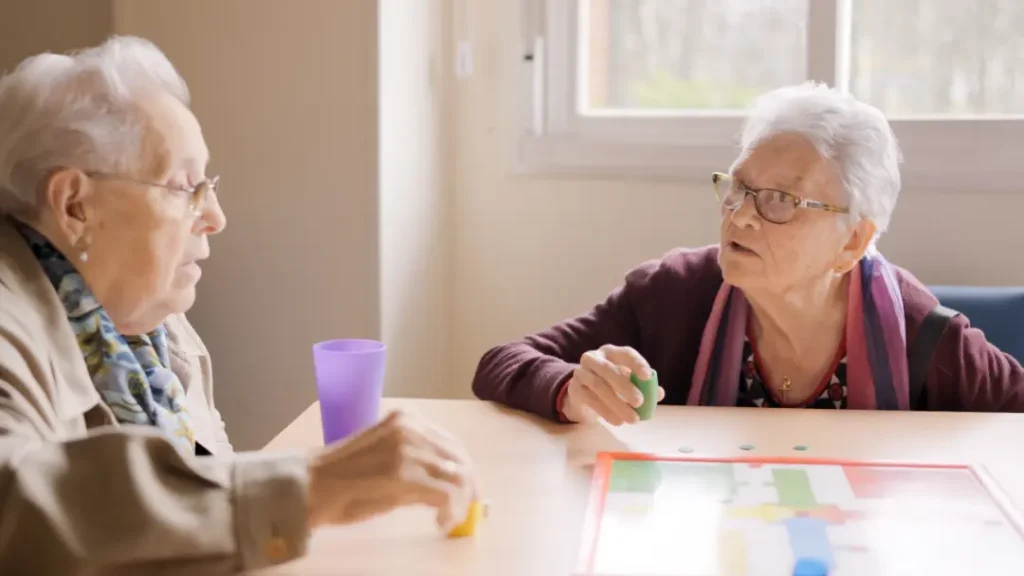Home care for dementia patients requires careful planning and practical strategies to ensure their well-being.
This guide covers essential tips on creating a safe environment, managing daily tasks, and supporting emotional health. Whether you’re starting out or looking to improve your care routine, you’ll find valuable insights here.
Key Takeaways
- Home care for dementia patients ensures they remain in familiar surroundings, reducing anxiety and maintaining their independence through personalised support tailored to individual needs.
- Challenges in dementia caregiving, such as managing behavioural issues and emotional stress, can be mitigated through strong support systems and continuous training for caregivers.
- Regularly updated personalised care plans and health evaluations are essential to support the evolving needs of dementia patients, enhancing their quality of life and overall well-being.
- A Star Care Services provides personalised dementia care in Solihull, ensuring your loved one receives the dignity, comfort, and support they need to thrive at home.
Understanding Dementia Care at Home
Caring for someone with dementia entails devising a specialised care regimen tailored to the individual needs of those affected by this condition, aiming to improve their quality of life.
The goal when providing dementia care is to help preserve the autonomy of these individuals through adherence to consistent routines on which they can depend. This method not only proves effective in managing the symptoms but also promotes familiarity and comfort, which are vital for people living with dementia, highlighting the critical role that dedicated caring plays.
A Star Care Services provides compassionate, specialised dementia care tailored to individual needs, ensuring comfort and dignity at home. With trained caregivers offering support for daily tasks, medication, and companionship, clients maintain their routines and quality of life. Families receive guidance and emotional support, helping them navigate the challenges of dementia with reassurance and peace of mind.

Benefits of Home Care for Dementia Patients
Dementia home care offers a critical advantage by allowing patients to stay in their own familiar environment, which can significantly diminish feelings of distress and bewilderment. This element of familiarity is vital for fostering a consistent and soothing setting for someone with dementia. Such support empowers them to preserve self-sufficiency, giving them the opportunity to partake in beloved activities within an area they are most comfortable with. From tending gardens and preparing meals to unwinding in their cherished seat, there’s no substitute for the solace that comes from being at home.
Services provided at home can be customised extensively to fit individual requirements. With live-in care arrangements where a paid carer resides with the person requiring assistance, continuous tailored support becomes possible throughout day and night according to what the patient needs specifically.
Personal assistants extend adaptable help by aiding dementia sufferers in engaging with personal hobbies and connecting with community resources when necessary.
By providing this bespoke attention on-demand, each individual is receiving appropriate aid as needed. Thus greatly contributing toward enhancing life quality through targeted personal care strategies.
Personalised Care Plans for Dementia Patients
Customised care plans are crucial in the realm of dementia care, as they significantly improve life quality for those with dementia by catering to their distinct needs. It’s important that these plans reflect the individual preferences and priorities of those affected by dementia, considering their specific health issues and desires. Such customised approaches not only boost support efficacy but also help sustain comfort and autonomy within one’s own home.
At A Star Care Services, we begin with an in-depth consultation to create customized care plans that focus on the specific needs of each client. This approach ensures that our clients receive exceptional care in the comfort of their own homes. Our personalised care strategies are designed to adapt to the evolving needs of patients with dementia over time, significantly improving their overall quality of life.
Creating a Life Story Book
A Life Story Book is a valuable tool in dementia care, capturing memories and helping patients reconnect with their identity. This personalised record reflects important aspects of a person’s life, enhancing understanding and connection between the patient and caregivers.
Preserving significant memories and experiences through Life Story Books provides continuity and comfort, contributing to a fulfilling life for dementia patients.
Adapting Care as Needs Change
Regularly reviewing and updating care plans is essential to meet the evolving challenges faced by individuals with dementia. As dementia progresses, a patient’s needs may change, requiring adjustments to their care strategy to ensure they receive adequate support and comfort. Frequent evaluations are crucial in making these necessary changes, enabling caregivers to respond effectively to the patient’s shifting needs.
Adapting care involves more than just medical modifications. It also includes adjusting daily routines and activities to align with the patient’s current abilities and preferences. This proactive approach ensures that individuals with dementia receive appropriate support at every stage of their condition, allowing for caregiving that truly addresses their unique requirements.
Daily Support and Assistance
Providing daily assistance and support is crucial in caring for individuals with dementia, as it aids them in managing their symptoms and preserving a sense of regularity. This help can take multiple forms, including physical activities that boost movement and coordination specifically for those suffering from Parkinson’s disease-related dementia to a variety of services designed to assist patients at home. These supports are crafted to simplify the lives of people living with dementia, allowing them to remain within the comfort of their own homes while upholding their dignity.
Alternative care options like daytime programs or full-time residential care facilities add layers of support for families and caregivers involved in dementia patient care.
These resources provide necessary breaks along with specialised attention required by patients so they may flourish receiving all-encompassing aid tailored towards addressing challenges associated with dementia.

Helping with Everyday Tasks
Engaging dementia patients in regular activities can cultivate a feeling of value and improve their sense of self-esteem. By including them in the execution of everyday tasks, caregivers give support that helps these individuals feel valuable and increase their confidence.
Employing visual aids and memory prompts can greatly assist with remembering where important items are placed. Establishing steady routines can also help alleviate feelings of distress for those living with dementia.
Meal Preparation and Nutrition
Creating dishes that dementia patients recognise can promote improved eating patterns and alleviate tension. Engaging these individuals in the process of preparing their meals not only increases their pleasure from food but also enriches the overall dining experience.
Implementing reminders for them to drink fluids is essential in tackling problems associated with inadequate hydration, which is key to maintaining their health and proper hydration levels.
Health and Well-being Checks
Frequent health assessments play a pivotal role in the successful management of dementia by detecting shifts in the patient’s state, allowing for appropriate and swift measures. A regular sleep pattern is beneficial for those with dementia, as it aids their general health and comfort levels. Caregivers support individuals with dementia to preserve their life quality through diligent observation of their health.
Such evaluations must encompass examinations of both physical and psychological aspects to cover all aspects of a patient’s welfare.
Collaboration with social services and leveraging amenities such as day centres delivers supplementary backing, along with changes in daily activities that are advantageous to patients dealing with dementia and those caring for them.
Monitoring Physical Health
Caregivers also ensure that dementia patients receive regular physical exams to monitor overall health and address any emerging issues. Regular dental check-ups are equally important for maintaining oral health. Keeping an updated list of medications helps manage prescriptions and avoid potential interactions, ensuring that patients receive the correct treatment.
Informing hospital staff about the patient’s dementia and providing a list of important facts can help in delivering appropriate care during hospital visits.
Mental Health Support
Consistently monitoring the mental health of those with dementia can facilitate the early detection of depression or anxiety, enabling interventions to be made at an opportune time. Participation in ongoing social events can greatly enhance the emotional state of individuals with dementia by fostering a sense of belonging and providing essential support.
Dementia diagnosis paves the way for personalized care approaches, while day centres and memory cafés provide environments conducive to social interaction, adding variety to daily life and giving caregivers much-needed breaks.
Establishing structured routines may alleviate feelings of anxiety and disorientation among individuals with dementia. Assisting them with their everyday tasks could bolster their confidence and help diminish any sentiments of insignificance they might experience. Caregivers faced with unfamiliar or difficult behaviours should seek advice from a general practitioner who may refer them to specialised mental health services that are equipped to handle every aspect pertaining to the patient’s overall well-being.
Night Care and Sleep Management
Patients with dementia often experience difficulties sleeping, which impacts their ability to achieve restful sleep at night. To address these challenges, it is important to maintain a regular sleep schedule and ensure that the sleeping environment is peaceful and relaxing.
If these sleep disturbances continue despite efforts to regulate them, it is recommended to seek advice from a general practitioner or community nurse. This will help guarantee that suitable measures are implemented to aid in supporting the patient’s health and comfort.
Managing Sleep Problems
Individuals with dementia may frequently awaken during the night, unaware that it is not yet morning. This can interfere with their sleep patterns and negatively affect their general well-being. Should these sleep issues continue, it is advisable to seek advice from a general practitioner or community nurse who can suggest possible treatments and approaches for improvement.
Organisations like the Alzheimer’s Society offer crucial support and information to assist in handling disruptions in sleep for those suffering from dementia.
Companionship and Social Interaction
Social engagement and meaningful interaction are key components in enhancing the quality of life for those with dementia. For individuals living with this condition, forming a foundation of trust is essential to successful communication and care provision. In an environment that feels supportive and non-confrontational, openness can flourish, helping to forge strong bonds between patients with dementia and their carers.
To ensure individuals with dementia maintain connections to others, carers actively encourage visits from friends and family members and organise social gatherings. Whether participating in local community events or simply sharing time together at home, these activities help bolster the person’s sense of inclusion within their community.
Facilitating Hobbies and Interests
Caregivers play a crucial role in ensuring that individuals with dementia retain their abilities and stay socially active. Motivating these patients to take part in communal pursuits, including creative arts, music sessions, or any other leisure activities they enjoy, can boost their social interaction and contribute to leading a satisfying life despite the challenges of dementia.
Involvement in groups for carers allows one to receive backing from peers facing similar circumstances and opens avenues for exchanging stories and insights, thereby enhancing the overall experience of providing care. Participating in delightful pastimes throughout the day has been associated with improved sleep quality at night for those living with dementia.
Utilising Day Centres and Memory Cafes
Day centres present a change in routine and chances for social interaction, which can significantly aid those with dementia. Memory cafés serve as casual settings that enable individuals living with dementia and their professional carers to meet and exchange stories.
A Star Care Services Specialized Dementia Care Services
Caring for a loved one with dementia can be emotionally overwhelming and physically demanding. At A Star Care Services, we understand the unique challenges families face, and we are here to help.
A Star Care Services offers specialised dementia care in Solihull designed to meet individual needs with dignity and support. Dementia can affect memory, thinking, and behaviour, creating challenges for both individuals and their loved ones. The goal is to provide tailored care that promotes well-being while maintaining comfort and familiarity at home.
Our fully trained caregivers assist with daily tasks such as washing, dressing, meal preparation, and household chores. Support includes medication prompting, companionship, and personal care, ensuring that clients remain safe, comfortable, and engaged in their regular routines. Care plans are flexible and designed to fit individual lifestyles and preferences.
Whether it’s assisting with daily tasks, providing companionship, or managing medication, we ensure your loved one continues to enjoy their routines, hobbies, and the warmth of family life — promoting comfort, stability, and joy.

Personalised Care Plans Tailored to Every Stage of Dementia
Our services begin with a comprehensive, compassionate assessment to understand your loved one’s unique needs, preferences, and routines. From early-stage support to more intensive care during advanced stages, we craft a personalised care plan that evolves with them.
Our caregivers are carefully matched to ensure not only professional compatibility but also emotional connection. This fosters a nurturing environment where your loved one feels safe, valued, and truly understood because they deserve nothing less.
Creating a Safe, Comfortable, and Joyful Environment
At A Star Care Services, we believe that quality of life matters, no matter the stage of dementia. Our caregivers prioritise creating a positive, supportive atmosphere where your loved one can thrive. This includes assistance with personal care, meal preparation, and household chores, alongside companionship and engaging activities tailored to their interests.
We understand the importance of familiarity and routine for dementia patients. That’s why we provide care in the comfort of their own home, surrounded by familiar faces, beloved pets, and treasured memories, ensuring they feel safe, secure, and content every day.
Let us help your loved one navigate their dementia journey with dignity, comfort, and compassionate support. Reach out today to schedule a free consultation. Together, we’ll design a personalised care plan tailored to their needs.
Continuous Training and Expertise
Consistent educational advancement is vital for those providing dementia care to refine their abilities and deepen their understanding, enabling them to deliver the finest level of support. Ongoing education ensures that caregivers remain abreast with optimal practices and are well-prepared to tackle the intricate challenges associated with dementia management.
Building Trust and Rapport
Establishing a foundation of trust and rapport with patients suffering from dementia is essential for delivering quality care. The staff at A Star Care Services, known for their compassion and experience, are dedicated to cultivating these relationships with clients starting on the very first day.
When caregivers develop a relationship based on trust, they can create an atmosphere that promotes better communication and improves the caregiving experience as a whole.
Alternative Care Options
Options such as respite care and residential care serve as vital support systems for individuals with dementia and their families. Respite care grants a temporary reprieve to primary caregivers, providing them the opportunity to address other duties while alleviating stress. These intermittent breaks are essential in preserving the caregiver’s health, allowing them to maintain high standards of caregiving.
When home care proves inadequate, transitioning into residential care might be necessary to provide an enhanced level of assistance for those with dementia. When considering alternative forms of caretaking, it is imperative to assess carefully the changing needs of the patient against the existing support provided at home. By examining these alternatives, families can ensure that loved ones with dementia have access to thorough and dignified levels of aid necessary for their comfort.
Respite Care
Temporary respite care offers primary caregivers a much-needed pause, allowing them the opportunity to rest while their loved ones with dementia still receive ongoing support. Depending on what the caregiver requires, this service can be scheduled for just a few hours or it could extend over multiple days.
When caregivers consistently take these breaks, they are able to alleviate stress and enhance their ability to give quality care to those with dementia. This ensures that they stay in good health and maintain their capacity to provide excellent support.
Transitioning to Residential Care
Deciding to move someone with dementia into a residential care facility can be challenging and necessitates a thorough assessment of the patient’s changing needs alongside the level of support they receive at home. Signs such as caregiver burnout or growing challenges in delivering adequate care may signal that relocating the person with dementia to a care home could be appropriate.
To facilitate their acclimation to this new setting, it is beneficial for individuals moving into a residential environment to have cherished personal items with them. This can help diminish anxiety and make adapting more comfortable. Some residential care facilities provide provisional stays for dementia patients so they might become acquainted with life in the facility before deciding on permanent residency.
Summary
Embarking on the path of home-based dementia care demands commitment, comprehension, and an abundance of support tools. It involves grasping both the advantages and hurdles associated with home care while crafting custom-tailored care strategies and delivering steadfast backing to those who provide daily caregiving. Such efforts are vital in elevating life quality for individuals with dementia by fashioning a caring backdrop that upholds well-established routines and cultivates social engagement.
At A Star Care Services, we are dedicated to providing compassionate, personalized care that meets the unique needs of your loved one. With our highly trained caregivers, flexible care plans, and unwavering commitment to dignity and respect, we ensure your family receives the support and peace of mind you deserve. Contact us today to learn more about how we can help you on this journey.
Frequently Asked Questions
What are the benefits of home care for dementia patients?
Dementia patients reap the advantage of staying within their well-known environment through home care, considerably diminishing feelings of anxiety and perplexity. This method promotes their autonomy and lets them participate in activities they enjoy, thereby improving their general welfare.
How can I create a personalised care plan for a dementia patient?
When devising a care plan for an individual with dementia, it’s crucial to integrate their specific likes and important concerns. This plan should be frequently reassessed and modified to cater to the changing requirements of the patient.
Employing this method promotes a custom-made and efficient experience in managing the care of someone with dementia.
How can I ensure the care provider respects what the person prefers if they have limited mental capacity?
A carer’s assessment can help identify the person’s needs and preferences, while a personal budget allows you to choose a care provider that prioritises their wishes, even if mental capacity is limited. This ensures both you and your loved one receive the right support.
What financial support is available for dementia care?
Financial support for dementia care can be accessed through local authorities, which conduct financial assessments to determine the level of care needed and the individual’s financial contribution.
This process helps identify eligible support and resources available for those in need.

